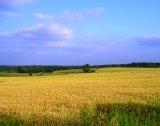What’s Forever?
 I was talking with a landowner recently about the restoration he and his wife are doing on their property, a former farm field. He said “It was a farm field forever, as long as I can remember.”
I was talking with a landowner recently about the restoration he and his wife are doing on their property, a former farm field. He said “It was a farm field forever, as long as I can remember.”
That comment got me thinking about the whole concept of forever. What does that word really mean?
Let’s think about that farmfield that’s being restored today:
It was farmed for maybe 175 years – possibly from the time the area was first settled. That’s a long time, for sure.
There’s an oak tree on the property that is about 240 years old. That oak was possibly there before there was a United States of America! I wonder how many oaks were there on the property 240 years ago when that one first sprouted? How many 100s of years had oak trees grown on that land? 500? 5,000?
And what about the wet area on the farm that was drained for farming in the 1920s? How many hundreds or thousands of years was it filled with swamp milkweed, sedges, bullrushes and all of the insects, birds and other wildlife that are coming back to the area now. The rich, deep, organic soils indicate that they were formed over thousands of years of plant growth and decay in a wet environment.
 You get the gist. Do we measure forever based on our lifetimes? An oak’s lifetime? The length of time it takes soil to form? The “life” of a Country?
You get the gist. Do we measure forever based on our lifetimes? An oak’s lifetime? The length of time it takes soil to form? The “life” of a Country?
Several years ago, my husband and I visited England, and while there toured a castle built 600 years ago that was still being lived in by a Duke & Duchess. We walked along part of Hadrian’s wall – a structure that was built nearly 2,000 years ago by the Roman Empire that has long since ceased to exist.
I’ve never visited them, but I know that some of the Pyramids in Egypt are more than 4,000 years old. A quick Internet search told me that the oldest structure discovered to date is a temple in Turkey that is more than 11,000 years old! Is that forever?
I’m thinking about this because forever is a word that we use a lot when we talk about our work at TLC. We promise to preserve land forever – we don’t say we’ll preserve it for 100 years, 1,000 years, or 11,000 years, but forever.
Synonyms for forever include everlasting, infinity, and “until the end of time.” The dictionary definition includes the phrases “without end,” “for a very long time” and “incessantly.”
Well, I don’t know what you think, but I could probably go on and on about forever until I’m blue in the face, but all things considered, it might be better to wait until the cows come home. Just don’t wait until hell freezes over – that would really feel like eternity!